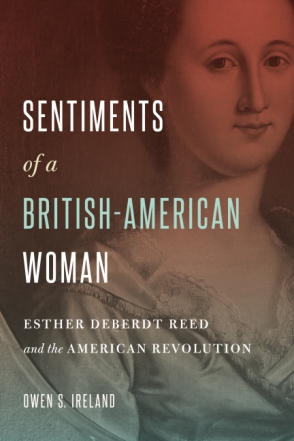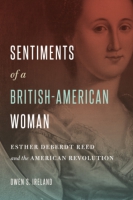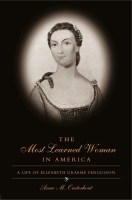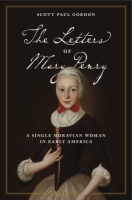
Sentiments of a British-American Woman
Esther DeBerdt Reed and the American Revolution
Owen S. Ireland
Sentiments of a British-American Woman
Esther DeBerdt Reed and the American Revolution
Owen S. Ireland
“A love story worthy of William Shakespeare, a snapshot of family life in catastrophic times, and a guide to what went wrong between Britain and its American colonies from 1764 to 1783.”
- Description
- Reviews
- Bio
- Table of Contents
- Sample Chapters
- Subjects
DeBerdt Reed’s life yields remarkable insight into the scope of women’s political influence in an age ruled by the strict social norms structured by religion and motherhood. The story of her courtship, marriage, and political career sheds light both on the private and political lives of women during the Revolution and on how society, religion, and gender interacted as a new nation struggled to build its own identity.
Engaging, comprehensive, and built on primary source material that allows DeBerdt Reed’s own voice to shine, Owen Ireland’s expertly researched biography rightly places her in a prominent position in the pantheon of our founders, both female and male.
“A love story worthy of William Shakespeare, a snapshot of family life in catastrophic times, and a guide to what went wrong between Britain and its American colonies from 1764 to 1783.”
“A beautifully written biography of a strong-willed, smart, and forgotten heroine. . . . Adding to the still scant scholarship on women in early America, Ireland’s book is enthusiastically endorsed.”
“Ireland's sharp analysis of Esther Reed's "Sentiments of an American Woman" shows her ideas and aspirations in action—as she was acting politically, using social acumen, employing strategic thinking, and enacting "the politics of image, or the politics of self-representation.””
“Ireland draws on rich collections of DeBerdt and Reed family letters to produce this excellent biography. He argues perceptively that, while in some respects, the life of his subject was extraordinary, in others her experiences were much like those of other smart, politically engaged, and affluent wives and mothers in revolutionary America.”
“In a comprehensive and moving study, Owen Ireland brings to light the important but little-known story of Esther DeBerdt Reed, one of the most powerful female figures to emerge during the American Revolution. Ireland chronicles the grand love affair between Reed, a privileged Londoner, and her husband, an American lawyer and patriot, and also explores how Reed became the leading organizer of the Philadelphia Ladies Association, a group that provided critical financial assistance to Washington’s troops. Improbable, inspirational, and instructive, Reed’s life is a tale of female self-invention and of love played out in the shadows of the Revolutionary crisis.”
“Historian Owen Ireland’s gracefully written full-fledged biography of Esther DeBerdt Reed, a British-born American patriot, is a welcome and necessary addition to Revolutionary Era history. Based on deep research, Ireland makes a compelling case for understanding the rich but tragically short life of Esther DeBerdt Reed, an important female politician and American founder.”
“This exciting book is a significant contribution not just to our understanding of revolutionary-era America but also to our understanding of global history itself. Esther Reed is a fascinating protagonist, and her transatlantic life—and especially her intercontinental courtship with her eventual husband, Joseph Reed—sheds light on the complex ties that connected the North American colonies to England and the wider world.”
“Sentiments of a British-American Woman is an exciting story of how Esther DeBerdt Reed negotiated the challenges of immigration, marriage, and Revolutionary politics. As an eminent political historian, Owen S. Ireland marshals his command of Pennsylvania politics and women’s history and, in quoting her substantial correspondence, allows DeBerdt Reed to speak for herself.”
“Despite Reed’s importance, this is the first full biography of this pioneer politician. It is, in Ireland’s telling, an engaging tale that mingles the drama and romance expected of a novel with the politics, finance, and suffering of Reed and her husband during the struggle for American independence.”
Owen S. Ireland is Distinguished Professor of History at The College at Brockport, State University of New York, and the author of Religion, Ethnicity, and Politics: Ratifying the Constitution in Pennsylvania, also published by Penn State University Press.
Contents
Acknowledgements
Introduction
Chapter One: Esther: Imprudent and Impatient Love
Chapter Two: Joseph: Love and Calculation
Chapter Three: A Willful Girl Matures
Chapter Four: Responsibilities and Schemes
Chapter Five: Politics: Old World Patronage
Chapter Six: Love Defeats Prudence
Chapter Seven: Exiled Where Women “stooped like country girls.”
Chapter Eight: A New Political Identity: “They” becomes “We”
Chapter Nine: “Unleash the Dogs of War”
Chapter Ten: Politics: New World Democracy
Chapter Eleven: America’s Female Politician
Chapter Twelve: Triumph and Tragedy
Bibliographical Essay
Notes
Index
From the Introduction
On September 19, 1780, Virginia congressman James Madison reported from Philadelphia, “President Reed’s Lady has been buried this morning.” Interred in the graveyard of the Arch Street Presbyterian Church, the thirty-three-year-old wife of the chief executive of Pennsylvania had died the day before, “taken off by the Dysentery.” Her death deprived the fledgling American nation of one of its most public, most effective, and most widely known political women.In the three years before her death, Esther DeBerdt Reed had converted her husband from military to political leadership, participated with him in building a powerful political party, led the Philadelphia Ladies Association in a multistate fund-raising campaign in support of the Continental Army, and politely but firmly debated with General Washington about how to spend the money she and her Ladies had raised. In “The Sentiments of an American Woman,” the political broadside she published in support of her fund-raising effort, she gave eloquent expression to the political aspirations of America’s new female citizens, while her Ladies Association itself provided the model for public engagement that women in America would employ with increasing effectiveness over the next two centuries. Her active engagement in the political world, where by law and by custom only men were members of the state, only men played independent political roles, and only men exercised autonomous political will, makes her worthy of our attention. Her name deserves to be known. Her story deserves to be told.Esther DeBerdt began life in London, England, in October 1746 as the indulged daughter of a well-to-do commercial family involved in the Atlantic trade with America. Her parents, evangelical Christians, were followers of the great sixteenth-century reformer John Calvin, and Esther grew up as a religious dissenter in a nation that was officially Anglican and in which religious and political identity were closely linked.In the fall of 1763, at seventeen, Esther met and fell in love with Joseph Reed, an ambitious young American staying in London to complete his legal studies and to advance his family’s interests. Esther’s father objected to their marriage, and Joseph returned home to New Jersey. Then, over the next five years, the young lovers conducted a clandestine transatlantic courtship by mail while Esther (in London) and Joseph (in America) worked to change her father’s mind and to use the patronage system of the British Empire to construct the economic foundation for their future family. In the spring of 1770, they married, and over the next ten years they negotiated a dynamic marriage distinguished by mutual affection, respect, and accommodation. Here, Esther challenged social norms and legal structures that emphasized parental power and pecuniary considerations in courtship and defined marriage as a hierarchical relationship between a dominant husband and a subordinate wife.Esther and Joseph had intended to live their lives in London, but a family tragedy drove them into exile in America, where they struggled to reestablish their economic base. Her father had introduced her to the intricacies of oceangoing commerce while she was still in her teens. Now, living in Philadelphia (1770–74), she intruded into this traditionally male domain by collaborating in the construction of a complex and lucrative trading network that spanned much of the British Atlantic world.Esther’s father had also introduced her to the complex world of patron/client politics in Georgian England, and she employed political means to advance her ends first in London in the late 1760s and then in Philadelphia. In the fall of 1775, she made a personal political decision to support the American struggle for independence and soon found herself plunged into the cauldron of war. After three harrowing years of disruption, disaster, isolation, and loss, she returned to Philadelphia and persuaded her husband to give up his military ambitions and accept political office. She then worked closely with him to advance themselves to the cusp of national political leadership. In 1780, acting in her own name, she launched a barrage of political initiatives that made her, at the time of her death, one of America’s most sophisticated, poised, confident, admired, and efficacious public “female politicians.” Here, as throughout her short life, this bright, determined, self-confident, and skillful woman, slight of frame but strong of will and blessed with a way with words and with people, exercised a “suitable command of self ” far greater than the law and the social norms her time and place seemed to permit.Throughout, however, she voiced little desire to end the existing gendered distinctions between female and male political action, or to assume male public responsibilities or obligations. Rather, she understood politics as part of the process whereby she and Joseph collaborated to marshal the resources they needed to marry, to create and sustain a love-based, religiously informed family, to seek éclat in the broader world, and to establish the foundation for their own and their children’s futures.Esther came of age at the beginning of the conflict between Great Britain and her North American colonies that produced the American Revolution. That world-altering conflict structured almost every phase of her life and bedeviled her at every stage of her evolution from a proud young English lady to a mature and ardent American wife, mother, patriot, political operative, and publicist. Esther’s story thus illustrates and illuminates for us the contingencies and human costs of the complex process whereby the English-speaking residents of British North America became a separate people, a new nation.After her death, Esther largely disappeared from our collective memory of the founding. Today she is recalled, if at all, for her notable political activities in the summer of 1780. Even those who are aware of her extraordinary success in those few months, however, know little of the life that brought her to this prominence, of the political context that made her behavior so noteworthy, and of the character, personality, values, and lifetime accumulation of political skill and understanding that prepared her to become by September 1780 one of the foremost political female founders of the American republic.Esther’s story falls into four broad categories. Chapters 1 through 4 focus on her initiation and management of her courtship (1764–65). Chapters 5 and 6 explore how she and Joseph, living on opposite sides of the Atlantic Ocean, first sought to accumulate the political and economic capital that would allow them to marry and live in London, and then retreated into exile in provincial America (1766–70). Chapter 7 deals with her unhappiness in America, her ever-growing family, and the impressive financial success she and Joseph achieved in Philadelphia between 1770 and 1775. Chapters 8 through 10 probe the nature of her decision for American independence and describe her wartime suffering as well as the Reeds’ rapid political ascent (1776–80). Chapters 11 and 12 detail her extraordinary political summer of 1780, her sudden death, the deterioration and death of Joseph, and the dispersion of their children. The coda offers a final appraisal of Esther DeBerdt Reed’s place among the founders of the American republic.A note to the reader: in quoting from correspondence, I have not tried to make eighteenth-century writers conform to modern prescriptions, but I have corrected a small number of obvious spelling errors.(Excerpt ends here.)
Also of Interest
Mailing List
Subscribe to our mailing list and be notified about new titles, journals and catalogs.





